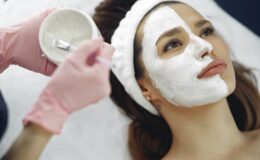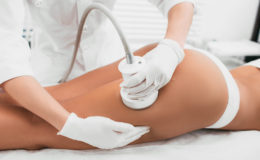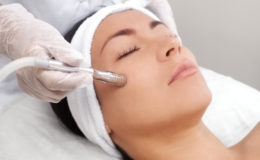What Is Microneedling?
Microneedling is a minimally invasive treatment used to rejuvenate skin and treat conditions such as wrinkles, acne scarring, stretch marks, and other signs of aging. Studies have also shown that it is safe and effective for various dermatologic problems, including striae and rhytides.
The procedure is an excellent option for mild to moderate acne scars, as it can help even out the texture and tone of your skin. It creates tiny punctures in the skin, encouraging your body’s natural healing process and stimulating collagen production. This leads to new tissue growth that replaces scarred areas with new, healthy skin cells. The result is smoother and clearer-looking skin.
In addition, microneedling creates microchannels in your skin that allows serums and other skincare products to penetrate deeply and break down scar tissue, making it more effective.
Some people who want to save money from the procedure might opt for microneedling at home, but you need to speak to a dermatologist before doing this. In some cases, it can worsen acne scars because of low-grade needles, and there’s a risk of infection if not done correctly.
Traditional Microneedling Vs. RF Microneedling
Note that traditional microneedling differs from RF microneedling in how it is done. While the first uses fine needles, RF microneedling for acne scars uses radiofrequency (RF) technology to heat the skin’s surface, which helps boost collagen production and reduce acne scars.
Its major advantage is that it has a faster healing time and offers quicker results than traditional microneedling, but it’s also more expensive.
Does Microneedling Work for Acne Scars of All Types?
In general, microneedling is effective for depressed or pitted but not raised scars (also called hypertrophic or keloid). Raised scars look like a bump on the skin, while depressed or atrophic acne scars are a hole or indentations.
Microneedling is more beneficial for atrophic scars, as it helps even out the skin’s surface. If you have raised acne scars, you already have an abundance of collagen in the area and microneedling may not work. Remember that microneedling induces collagen production to improve the appearance of acne scars.
Laser treatments are typically more effective for raised acne scars since they can target the extra collagen through a process called thermal damage. By creating controlled burns to the skin, the laser can break down collagen and cause it to rebuild itself in a smoother, more even pattern.
Is Microneedling for Acne Scars Permanent?
Many patients may ask, “is microneedling permanent for acne scars?”
Unfortunately, it is not a permanent solution for acne scars, as the results will eventually fade. While you may notice improvements immediately, the full effects of this cosmetic procedure usually appear after several weeks or months. In general, you can enjoy its benefits for up to 3 to 5 months, and then you’ll need to have treatment sessions to maintain your results.
How Many Microneedling Sessions for Acne Scars Do I Need?
The number of microneedling sessions you need will largely depend on the severity and type of your acne scars. Typically, most people require 3 to 6 treatments for optimal results.
However, people have different recovery times, healing processes, and responses to the procedure. For instance, one patient may see results after the second session, while another may need more treatments to achieve the same results. Similarly, microneedling for deep acne scars may require more treatments than superficial ones. You can try other treatments like dermabrasion if you have severe scarring.
It’s also important to note that microneedling treatments are most effective with other treatments, such as laser therapy and chemical peels. This helps maintain optimal skin health and enhances results for a more long-term solution for acne scarring.
Microneedling Vs. Laser for Scars
Microneedling and lasers are both excellent aesthetic treatments for improving the appearance of acne scars. However, there are differences between the two that you should consider when deciding which one to pursue.
As mentioned, a laser is more effective for raised acne scars as it creates heat energy and can target specific skin depths. As such, lasers are more effective for deep scarring than microneedling. However, microneedling is more suitable for a broader range of skin issues, such as reducing wrinkles and brightening pigmentation. It also has fewer side effects than laser because it does not use heat energy to treat skin conditions.
Their major similarity is they both have risks and potential side effects, including infection and pigment changes.
Microneedling Vs. Chemical Peeling for Acne Scars
Chemical peels eliminate the outer layer of the skin, reducing the appearance of acne scars. Like microneedling, this type of treatment is not recommended for those with active acne because it can further irritate the skin and trigger acne breakouts. Additionally, chemical peels are more likely to cause irritation, redness, dryness, and sensitivity than microneedling.
It’s also important to note that while both treatments stimulate collagen production and improve the appearance of acne scars, they do so in different ways. Chemical peels are better at addressing uneven skin tone and wrinkles, and removing damaged skin cells. However, microneedling has more ability to create tiny channels in the skin for serums and other skincare products to penetrate deeply.
The choice between microneedling treatment or chemical peels for treating acne scars will depend on the severity of your acne scars and what you’re most comfortable with. Your dermatologist can also help you decide. In some cases, combining both treatments may be recommended for more visible results.
Can Collagen Supplements Reduce Acne Scars?
Supplements with collagen for acne scars are one of the latest trends in skincare. This can be in the form of powder, capsule, drinks, or candies.
As mentioned, collagen is the main structural protein that helps keep skin looking firm, smooth, and wrinkle-free. Our bodies naturally produce less collagen as we age, leading to wrinkles, sagging skin, and acne scars. Supplementing with collagen can help restore this loss of collagen.
The question of whether collagen supplements reduce acne scars is still inconclusive. Currently, no scientific evidence supports the claim that these can reduce acne scars. While microneedling encourages collagen production to minimize acne scars, collagen supplements may not have the same effect. However, they may appear beneficial in reducing wrinkles and improving skin elasticity and hydration.
It’s best to talk to your dermatologist about the most suitable option to treat acne scars based on your situation and if collagen supplements are viable for you. And while collagen supplements may not be a guaranteed solution for acne scars, they might be worth trying if you want to take a more holistic approach towards skincare. But even if the body tolerates them well with little to no effects, consult your doctor before taking any new supplement.
Final Thoughts
Microneedling procedure is an effective, safe, and minimally invasive acne scar treatment. It is known to stimulate collagen production and improve skin texture and tone. Compared to laser treatments and chemical peels, microneedling is less expensive and has fewer side effects. But you are not a good candidate if you have active acne and deep scars. It’s best to consult your doctor before deciding which treatment is proper for you to make your skin healthy.




